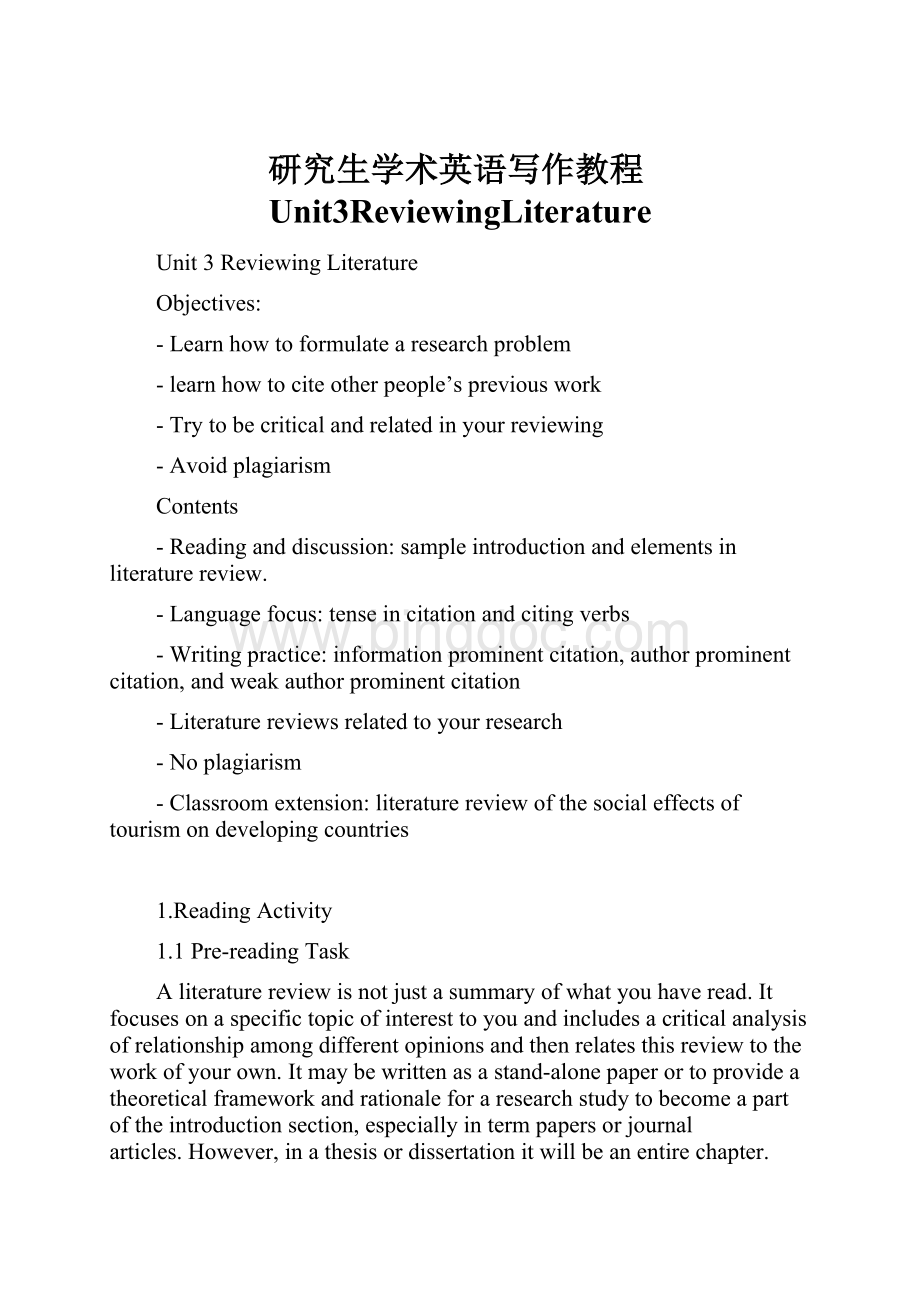研究生学术英语写作教程Unit3ReviewingLiterature.docx
《研究生学术英语写作教程Unit3ReviewingLiterature.docx》由会员分享,可在线阅读,更多相关《研究生学术英语写作教程Unit3ReviewingLiterature.docx(13页珍藏版)》请在冰点文库上搜索。

研究生学术英语写作教程Unit3ReviewingLiterature
Unit3ReviewingLiterature
Objectives:
-Learnhowtoformulatearesearchproblem
-learnhowtociteotherpeople’spreviouswork
-Trytobecriticalandrelatedinyourreviewing
-Avoidplagiarism
Contents
-Readinganddiscussion:
sampleintroductionandelementsinliteraturereview.
-Languagefocus:
tenseincitationandcitingverbs
-Writingpractice:
informationprominentcitation,authorprominentcitation,andweakauthorprominentcitation
-Literaturereviewsrelatedtoyourresearch
-Noplagiarism
-Classroomextension:
literaturereviewofthesocialeffectsoftourismondevelopingcountries
1.ReadingActivity
1.1Pre-readingTask
Aliteraturereviewisnotjustasummaryofwhatyouhaveread.Itfocusesonaspecifictopicofinteresttoyouandincludesacriticalanalysisofrelationshipamongdifferentopinionsandthenrelatesthisreviewtotheworkofyourown.Itmaybewrittenasastand-alonepaperortoprovideatheoreticalframeworkandrationaleforaresearchstudytobecomeapartoftheintroductionsection,especiallyintermpapersorjournalarticles. However,inathesisordissertationitwillbeanentirechapter.
Readthesampleintroductionbelowandthinkaboutthefollowingquestions:
Whatisthepurposeofwritingaliteratureview?
Whatelementsdoesanintroductioninclude?
Howdowerelateotherpeople’spreviousworktoourpresentresearch?
Howdoweciteotherpeople’spreviouswork?
1.2ReadingPassage
Introduction
Thepoorhavetraditionallytakenthebruntoftheblameforcausingsociety’smanyproblemsincluding,morerecently,environmentaldegradation.Thereisageneralconsensusthatpovertyisamajorcauseofenvironmentaldegradation.Forexample,inoneoftheconclusionsoftheBruntlandCommissionReport,whichincidentallyhasbeenacceptedastheblueprintforenvironmentalconservation,itwasexplicitlystatedthatpovertyisamajorcauseofenvironmentalproblemsandameliorationofpovertyisanecessaryandcentralconditionofanyeffectiveprogramsaddressingtheenvironment.Followingsimilarlines,Jalal(2010),theAsianDevelopmentBank'schiefoftheenvironmentdepartmentsays,"Itisgenerallyacceptedthatenvironmentaldegradation,rapidpopulationgrowthandstagnantproductionarecloselylinkedwiththefastspreadofacutepovertyinmanycountriesofAsia".TheWorldBankjoinedtheconsensuswheninthe2011WorldDevelopmentReport,theBankexplicitlystatedthat,“poorfamilieswhohavetomeetshorttermneedsminethenaturalcapitalbyexcessivecuttingoftreesforfirewoodandfailuretoreplacesoilnutrients”(WorldBank2011).
However,therehasbeenarisingtrendintheeconomicliteraturewhichdisputestheconventionaltheoryandarguesthatsimplegeneralizationsofthismulti-dimensionalproblemareerroneousandthatamorecomplexsetofvariablesareinplay(LeachandMearns,2012).Thesestudiespointtodemographic,cultural,andinstitutionalfactorsasimportantvariablesinthepoverty-environmentaldegradationnexus.Anintricateweboffactorsplustheexistenceoffeedbackloopsfromenvironmentaldegradationtopovertymakestheprocessofidentifyingcausalitylinks,ifany,betweenenvironmentaldegradationandpovertyadifficultexercise.However,thesestudieshavebeenfewandisolatedanditisinterestingtonotethatuntilrecently,therehasbeenverylittlein-depthcoordinatedempiricalresearchintheeconomicsofenvironmentaldegradation-povertycausalityrelationships.
Thisbringstothepurposeofthisstudy.Bothpovertyandenvironmentaldegradationhavebeenincreasinginmanydevelopingcountries;hencethereisapressingneedfirsttoevaluateandanalyzethepoverty-environmentaldegradationnexus,andsecond,toprescribepolicyoptionstomitigateoreradicatethesetwoproblems.
Theprimaryobjectiveofthepaperistoanalyzecriticallytheexistingliteratureonthepoverty-environmentaldegradationnexusandtrytomake"someorderoutofthechaos"inherentinthiscomplexanddifficultsubject.Forthispaper,ouranalysisislimitedtothefollowingfourmainnaturalresourceswhichareunderseriousthreatofdegradationinmanydevelopingcountries:
i)forests;ii)land;iii)water;andiv)air.Biodiversityisexcludedatthispointbecausethepreliminaryliteraturesearchfoundonlyscatteredandinconclusiveinformation.However,itshouldnotbeinferredthatbiodiversityislessimportantthanthefourresourceschosen;indeeditisanareawhichneedsparticularattentioninthefuture.
Oncethenaturalresourcesectorshavebeenidentified,acause,impactandfeedbackanalysisiscarriedout.Inthismanner,wehopefirsttoidentifythemainagentsandthedegreeoftheircontributiontowardsthedestructionoftheenvironmentandsecond,theincentivesormotivatingfactorsencouragingtheirunsustainableactivities.Theimpactandfeedbackanalysisshouldhighlightthemainimpactsarisingfromthedegradationactivitiesandthesocio-economiceffecttheseimpactshaveacrossthevariousincomegroupsintheeconomy.
1.3ReadingComprehension
1.3.1Listdifferentopinionsonpovertyandenvironmentaldegradation
BruntlandCommissionReport,etc.ontheoneside
LeachandMearnsontheotherside
1.3.2Decidehowmanyelementsthissampleincludesandhowtheyfunction.
Elements
Functions
2.LanguageFocus
2.1Tenseincitation
Presenttense-Authorsmostlyusethepresenttenseverbstoshowtheiropiniononanotherperson'sresearch,relatewhatotherauthorssayordiscusstheliterature,theoreticalconcepts,methods,etc.However,thesimplepastandpresentperfectarealsopossibleverbformsinthiscase.Lookattheseexamplesinthepresenttense:
∙Nelson(1995)remarks
∙Jones(2005)stresses
∙Morison(2000)advocates
∙Zhang(2007)claims
∙Zhambhi(2008)argues
Pasttense-Whenyouusethepasttense,thereportingverboftenoccursasanintegralcitation. Inotherwords,citationswithpasttenseverbsandnamedresearchersassubjectseemtohavethediscourseroleofprovidingparticularsforrecountingevents,resultsfoundoraprecedinggeneralizationorthebasisforaclaim,etc.Intheexamplebelow,thecitationreportstheresultsofasinglestudy.
CarlsonandBenton(2007)foundthatastheyincreasedtheparticipants’stresslevels,theresultsoftheirperformancedeteriorated.
Commonverbsinthepasttenseare:
investigated,studied,compared,analyzed,found,andexamined.
Presentperfect- Thepresentperfecttensecanbeusedtostatethattheresearchresultsarerecent,expressingwhathasbeenfoundoveranextendedperiodinthepastanduptothepresenttohighlightthedirectrelevanceofpreviousstudiestothewriter'sownresearch.Lookatthefollowingexample:
Althoughtheresultsofperviousstudiesshowedthatfurtherresearchwaswarrantedinthisarea,recentstudieshavedemonstratedthateducationalmethodologyisnowmovinginanewdirection(Jones,2007;Karstal,2008).
2.1.1Checkthesampleintroductionandcompletethefollowingtable.
Questions
Howmany?
Forwhatpurposes?
Aresomesentenceswritteninpresenttense?
Aresomesentenceswritteninpasttense?
Aresomesentenceswritteninpresentperfecttense?
Whichtenseisusedmore?
Whydoyouthinkthisisthecase?
Howmanysentencescontainreferences?
2.2Citingverbs
Itisimportantthatyoulearnhowtociteinformationinacorrectway.Therearecertainconventionstofollowwhencitingsomeone’swork.Wordslike“say”,“tell”,and“ask”arenormallyusedinoralconversationsbutarenotappropriateinformalacademicwriting.Thefollowingtableillustratessomeappropriatewordstouseforreportingtheworkofothers.
Verbsforsaying
Jalal(1993)
claims
believes
thinks
assumes
indicates
notes
remarks
states
shows
pointsout
that…
MoreVerbsforsaying
Jalal’s(1993)study
suggests
considers
hypothesizes
concludes
comments
emphasizes
illustrates
proposes
establishes
maintains
that…
Verbsrespondingtoothers’opinions
TheanalysisoftheJalal’sreport
accepts
admits
agrees
doubts
denies
argues
comments
that…
Verbsforsayingasecondtime
Jalal(1993)further/additionally
asserts
explains
confirms
maintains
advocates
that…
Poorpatternsshowthatthewriterhasameregraspoftheliterature:
Jalal(1993)saysthat…TheAsianDevelopmentBank(1992)statesthat…LeachandMearns(1995)arguethat…
Bettersampleshowssomecriticalthinkingandsentencevariety:
Jalal(1993)reportsthathisstudyof…shows…ThefindingsaresupportedbytheAsianDevelopmentBank(1992)replicationof…Althoughboththesestudiesfocuson….Theyhaveignored…AccordingtoLeachandMearns(1995),…
2.2.2Readthreeextractsontheissueofpovertyandcrime.Usetheverbsabovetociteopinionsonpovertyandcrime.
3.WritingPractice
3.1Usingreferences
Usecitationtodevelopyourownargument.
Belowareexamplesofpartsofparagraphsusingthreedifferentcitationmethods
(Thereferencescitedhavebeeninventedfordemonstrationpurposesonly).Thesemethodscanbecalledinformationprominent,wherethefocusofthesentenceisonlyontheinformationbeingpresented;authorprominent,wherethenameoftheauthoroftheinformationisgivenprominenceinthesentence;andweakauthorprominent,wheretheideasofauthor(s)aregivenprominence,butauthors’namesdonotappearinthemainpartofthesentence.Observehowthedifferentmethodscontributetothewayinwhichthewriter’sargumentisdeveloped.
Informationpromi